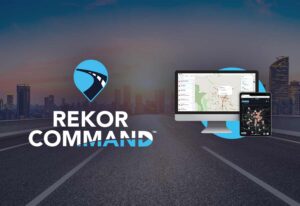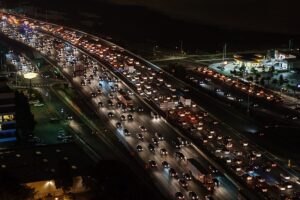I come from a road building background. Part of the joy of my life was growing up in my father’s business Nigro Bros. Construction. I worked in his office starting when I was 9. I loved going to work there. I knew everything about the road building business, and I would have probably still been in the business if I wasn’t a girl at the wrong time. Was not an option for a woman back then to rise to a formidable job in the construction business, thus my choice to go into into the communications industry. Timing is everything and I’m so glad women now have more opportunities to rise in all industries.
Anyway, moving forward as we always do in life and there are always new opportunities! New innovations! Like AI. Of course we’re following artificial intelligence in a big way as we all try and figure out what the heck to do with this new ability.

When it comes to AI and roads, I happened to read about a company called Rekor I wanted to know more about. They’re out there using artificial intelligence to keep tabs on the movement of traffic and roadway data, and they’re going to keep roads and construction workers and truckers and law enforcement officials and drivers safer, as they identify trends using their analytics capability.
David Desharnes, Chief Operating Officer of Rekor, joined me to share a little education for us all. It’s obvious a lot is going on the roads these days. Where I come from up here in the New York, Connecticut the Tri-state area everybody is sick of the traffic. What are we doing about all this traffic?

David said yes, “There’s a load more traffic everywhere in the last decade, plus the additional movement of people into urban centers. New York, obviously being a major urban center, if not the granddaddy of all.”
“We went from 10 mega cities, which, equates to about 10 million population or above, to 30 now, mega cities. So, the idea that more people are getting crunched into tighter and tighter confines trying to get from point A to point B has never been more of a problem.”

David has had a lot of interesting jobs and in most positions, he’s been responsible for global strategy and engineering and teams a management and data and analytics. He was even the general manager of worldwide industries for Amazon Web Services. He obviously knows a lot about things moving around.
So how is Artificial intelligence being applied to all that?
“Well you know artificial intelligence is a sometimes a scary term for people, but effectively, the simple way to think about it is that it’s really helping people do more of what they’re good at. It’s helping law enforcement, traffic management centers, road crews and maintenance, to stay ahead of what’s happening on the roads. Artificial intelligence really adds arms and legs and the ability to consume information and help those fine folks make better, faster decisions. They’re informed with information that is accurate and real-time and, in many cases, even predictive.”
David gets excited about AI’s potential to allow us to adapt to a more vibrant and very complex environment, that becomes overwhelming for us to be able to handle on a day-to-day basis. Rekor located in Columbia, Maryland figured out how to utilize AI for something that was needed that didn’t exist. Road congestion is one of the major issues that not only cities face, but any major metropolitan area. Sadly, and tragically nearly 44,000 people a year are killed on roadways, and that’s not even talking about bicycles and pedestrians. And the problems to fix are just mounting. David said, “About 125 people a day are being impacted on the roadways through fatalities, which if that was any other condition or any other news story, that would get a lot of attention. But it’s kind of just, become part of the hum.”
Congestion is an issue, roadway fatalities are an issue, and even more so things like greenhouse gas emissions. The number one polluter of greenhouse gas or emissions, are vehicles and transportation said David.
“All of these things are really conflating to create a very difficult challenge for road workers, for traffic management centers, for governments, local governments that are trying to keep people safe and healthy. All of those things are challenged by the sheer volume of vehicles that are on roadways. And it’s not just your granddad’s vehicle it’s also fancy cars like connected vehicles electric vehicles and all kinds of different modalities. You’ve seen scooters, you’ve seen all kinds of things on the roadway. How do you keep that all straight? How do you keep that all humming and congestion free? It’s very, very difficult to do.”
“And that’s the challenge that our road workers and departments of transportation are facing. Artificial intelligence helping with flow for these who need this knowledge, identifying whatever is moving on a roadway.”
Another practical example said David, would be an incident. Could be anything from a debris on the highway or a dead deer on the highway to a 12-car pile up.

“Once an incident happens, and this is mind-boggling to me, for every one minute of an incident on a highway that can be minor to major, every one minute of the delay creates a four to nine minute backup of traffic. The ability to respond to it, get out of the way, get it out of the way, so that traffic can keep flowing is really a difficult task. Rekor enables that by being able to give real-time predictive analytics. Imagine somebody sitting in a in a traffic management center looking at a wall of screens trying to visually see what’s going on and that could be overwhelming. But if you can bring automation to say, here’s what matters, here’s where it matters, here’s options to go resolve it, they can just get it out of the roadway more quicker, and I’m just using one example.”
Rekor deals with about 20 trillion, different signals coming in. Waze is one of them, but also are things like connected vehicle data. Any car that was built after 2016, is going to be a connected vehicle. And this is rolling data information. It’s like a mobile phone times a thousand, said David.
“Rekor is using AI to provide real time intelligence to the world and also predictiveness. Like for example, if you look at what’s the weather conditions outside? Now you can look outside and say, oh, it’s raining. But what impact does that have on the roadways in particular? Is it windy? Is it rainy? Are people over-speeding? And in these conditions, what’s the probability that something will happen in this area of interest. Maybe it’s a wise decision for me to put an officer out there or somebody in the highway patrol to just even park a dummy car out there because I don’t know about you but when I see a license, when I see an officer’s car I tend to slow right down. So those kinds of things that can be done that are very simple but they’re predictive. If you could predict where something may happen, you could actually get ahead of it and maybe save lives and remove congestion ahead of time.”
![]()
Rekor has been at this since 2018 and they service about 60% of the US states and 90 countries around the world today with what they do. They’re bringing intelligence to the roadway or roadway intelligence through AI and smart sensors and connected vehicles. They’re inside of things like traffic management centers and inside of departments of transportation operations who are planning to build new roads.
According to the US government studies, one semi-truck inflicts as much wear and tear on roads as 9,600 cars, and it’s tearing up the roadway. Being able to know what’s moving on a particular roadway is important when you’re thinking about what material to use to build the next road.
Was good to better understand how artificial intelligence is playing into all of this. We need to stay educated. David Desharnas and Rekor are behind the scenes working to make the roadways a safer place for all. Enjoy the podcast of our live radio conversation from The Debbie Nigro Show.



